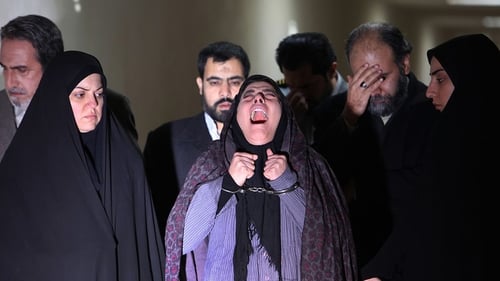
Morteza Poursamadi
Birth : 1952-01-01, Tehran, Iran
History
Morteza Poursamadi (مرتضی پورصمدی) is a renowned cinematographer and photographer, born 1952, Tehran, Iran. He has famous for having a filmography of over 100 documentaries and 23 films traveling more than 500000 kilometers to shoot documentaries ethnic groups and cultures and has housed exhibitions across Europe and Canada. Morteza Poursamadi has worked on award-winning titles such as Hiss Dokhtarha Faryad Nemizanand (2013) which won the best film for narrative feature at the Women’s Independent Film Festival, Paper Airplanes Mooshak e Kaghazi (1997), best film at the Isfahan International Festival of Films for Children & Young Adults and the documentary The Old Man of Hara Pire Hara (2002), which won the New Asian Currents - Award of Excellence at the Yamagata International Documentary Festival. He has won various awards for his cinematography, International Roshd Festival, Miras Farhangi (cultural heritage) Festival and he also received a Crystal Sigmor at the Fajr International Film Festival for best director.

Cinematography
An Iranian movie about Iran_Iraq war

Director of Photography
Confrontation of two different generations can lead to some incidents. In FATHERS an incident brings two generations together.

Director of Photography
Kaveh Nariman is a Doctor in the medical examiner's office. One day at his work he meets a corpse which is very familiar to him.

Director of Photography
A man named Jalal publishes an unusual advertisement in one of Tehran’s morning papers to donate $10,000 to a needy person. The news gathers a large group of people. At the end of the day, he receives many application forms, and he eventually decides to choose one by chance. Those who have applied insist that what's been advertised is the only solution to their problem. The police take charge of the situation by calming the people and having them dispersed. However, two women do not give up: Setareh, a 19-year-old pregnant woman, and Leila, Jalal’s ex-fiancée…

Cinematography
An accidental encounter between a man and a woman changes their future.

Cinematography
Hours before her scheduled marriage, young bride-to-be Shirin murders a man. The crime is completely unexpected and goes against everything we know of her. We learn that Shirin has had two unsuccessful marriage attempts, and is deeply psychologically troubled. But as the dark secrets in her past are slowly revealed, exposing a childhood of neglect, abuse, and the tragic history of two previous failed marriages, the characters must face their own battles with justice, retribution and morality.

Cinematography

Director of Photography
The war between Iran and Iraq is raging. Near the border on the Iranian side, an old man takes care of martyrs’ graves by the little cabin where he lives with his wife and grandson, while the boy’s father is fighting in the war. Suddenly one day, their home is invaded by a wounded Iraqi officer and two of his subordinates. They desperately need care and a place to hide. The intruders and the little family do not understand each other’s language, the tone is aggressive and an intense, life-and-death chamber play ensues.

Cinematography
A woman is suspicious of her husband that he has cheated on her with another woman but little by little she begins to doubt more about that and grows nervous.

Director of Photography
A mother's courage, hardship, and love, in times of war. In 1988, during the Iran-Iraq war, Gilane escorts her pregnant daughter, Maygol, from the relative calm of their village, Espili, into war-torn Tehran to search for Maygol's husband, Rahman. The journey is arduous and what they find when they reach the capital is dismaying and frightening. Fifteen years later, as another war begins in Iraq, Gillane is at home caring for her son Ismael, who suffers from epilepsy, a byproduct of war. As she cares for him, she hopes for a visit from the doctor and from another daughter, Atefah. "Better be a dog than a mother," she says.

Cinematography
24 hours in Tehran. A traffic cop is interested in an actress, two old sourpusses terrorise the drug control lab, not everything a taxi driver says is the truth and a building worker seems to be in love.

Director of Photography
This documentary is about the rangers who serve in the Lake Urmia area. They give water to local animals such as deer and help birds that fall into the water and cover their body with salt crystals. One of the rangers stays on an island in the middle of the lake and is unable to move his boat due to the high salt water. A boat comes to his aid at night. The birds of this lake are extinct due to the high salt content of the water.

Director of Photography
Mukarrama is an old woman in one of the villages of Mazandaran who cannot read or write and suddenly turns to painting. In his memoirs and dreams, he depicts the relationship between a man and a woman, master and servant, man and God in a special style.

Director of Photography
Every year in the middle of winter, the residents of the village of Oraman Takht in Kurdistan hold a ceremony in memory of a mystic man for two weeks. This film is a look at this ritual.

Director of Photography
The documentary "Taraz" is about a group of nomads in Bakhtiari alley who live in two provinces of Khuzestan (tropical region) and Chaharmahal and Bakhtiari (cold region) every year according to the hot and cold seasons. The group, which spends seven months of the year in an area north of Masjid Suleiman (Andika), migrates from this area to their summer territory on the southern slopes of Zardkuh in late April. As the weather cools in their cold territory and before rain and snow fall, they return to their winter territory in Khuzestan province in September. (A group of nomads about whom the film Taraz has been made is a few families from the "Bamdi" tribe of the "Haft Lang" Bakhtiari tribe.)




